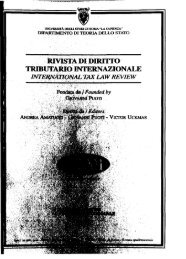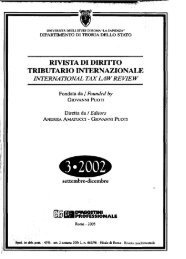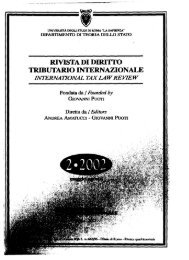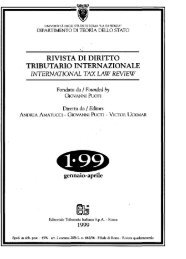RIVISTA DI DIRITTO TRIBUTARIO INTERNAZIONALE - Rdti.it
RIVISTA DI DIRITTO TRIBUTARIO INTERNAZIONALE - Rdti.it
RIVISTA DI DIRITTO TRIBUTARIO INTERNAZIONALE - Rdti.it
Create successful ePaper yourself
Turn your PDF publications into a flip-book with our unique Google optimized e-Paper software.
G. Petrillo: Interpellation in the Statute or Taxpayers' Rights<br />
particular interests of the taxpayer, and specifically, <strong>it</strong> is intended to give<br />
rise on a preliminal)' basis to a clarification regarding areai problem of<br />
uneertain interpretative of law. The interest in presenting same must<br />
therefore be leg<strong>it</strong>imated by "objective eond<strong>it</strong>ions of uncertainty as to the<br />
correet interpretation of the tax regulations".<br />
The interpretational aetiv<strong>it</strong>y - which is the result of the pet<strong>it</strong>ion - must<br />
of course respond to same by identifying the rule applicable in the concrete<br />
case in question (41). It is also usefu!, before establishing the nature of the<br />
interpellation, to specify that the Administration on the oecasion of the exerdse<br />
of <strong>it</strong>s power performs not only acts that const<strong>it</strong>ute measures, i.e. expressions<br />
of will endowed w<strong>it</strong>h effectiveness in terms of the generai regulations<br />
(42), but also acts instrumental to other powers (opinions, proposals,<br />
supervisol)' acts, assessments), also termed declarative acts; these acts<br />
consist of declarations of knowledge whieh do not have a vol<strong>it</strong>ive contento<br />
The reply is, from this standpoint, a declaration of knowledge regarding<br />
the clear interpretation of the regulations which is binding, provided the<br />
s<strong>it</strong>uation described by the taxpayer is not different, upon the adrninistration<br />
in the exercise of the tax-Ievying funetion. Declarativeness, <strong>it</strong> is noted,<br />
"is assumed in the strict sense of non creation of subjective juridical s<strong>it</strong>uations<br />
(43)"; the juridical effect produced by the performance of the activ<strong>it</strong>y<br />
by the administration, in the case in point, indeed, will not consist of a<br />
modification, const<strong>it</strong>ution or extine<strong>it</strong>ion of juridical s<strong>it</strong>uations, but instead<br />
of a mere declarative effect (44). The function of the "reply" is to remove<br />
(41) On this point, see E. Paresce, entry ent<strong>it</strong>led "Interpretazione", in Enc. dir., Milano,<br />
1972, p. 234 who observes that "declarative interpretation can be said to be what<br />
one has whenever pragmatic considerations lead to a choice between several interpretation,<br />
all possible and reasonable, in the context of the naturallinguistic meaning<br />
of the text".<br />
(42) A.M. Sandulli, Manuale di dir<strong>it</strong>to amministrativo, Naples, 1984, p. 591, remarks<br />
that such measures are "typical and nominated author<strong>it</strong>ative acts pre-ordained<br />
for the realisation of specific interests entrusted to the care of the administration, and<br />
consisting of enactments destined to produce changes in juridical s<strong>it</strong>uations, or to<br />
refuse changes that may have been requested by the parties concemed''''.<br />
(43) Thus Giannini, entry ent<strong>it</strong>led "Public certainty" in Enc. dir., Milan, 1960, p.<br />
785, note lO.<br />
(44) A. M. Sandulli, Manual of administrative Iaw, Naples, 1984, page 624, after<br />
having outlined the relations existing between "procedures and cases in point" underlined<br />
that w<strong>it</strong>mn the sequence of an administrative procedure one can find, on the<br />
one hand, elements that are merely preparatory, and on the other, elements that are<br />
effectively operative in terrns oflegal effect, since the latter may be not only "elements<br />
property const<strong>it</strong>utive of the legal effect, but also mere elements integrating <strong>it</strong>s effectiveness<br />
or declarative - this latter adjective being understood in <strong>it</strong>s particular meaning<br />
as an element that does no more than cond<strong>it</strong>ion effectiveness w<strong>it</strong>hout <strong>it</strong>self being<br />
const<strong>it</strong>utive of the legaI effect.<br />
<strong>RIVISTA</strong> <strong>DI</strong> <strong>DI</strong>RlTID TRlBUfARlO <strong>INTERNAZIONALE</strong> ll2l11I






